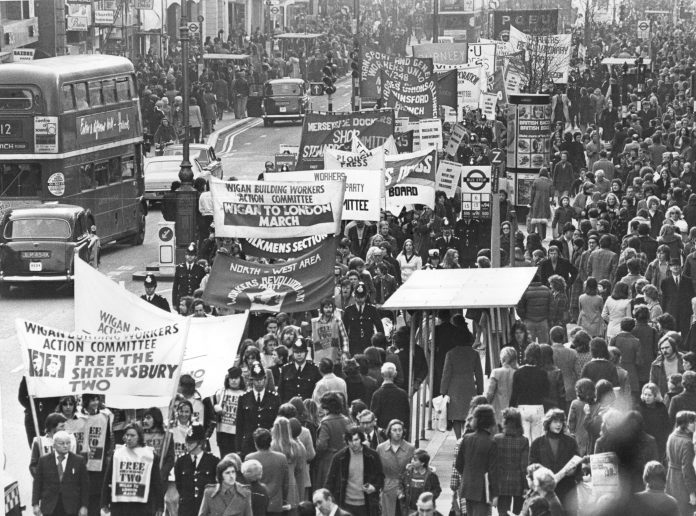
THE article in the News Line last Wednesday brought back not just memories of my personal involvement in the campaign led by the Young Socialists and WRP to release the jailed Shrewsbury building workers, but also the lessons that this struggle has for the working class today.
In the spring of 1975, the Young Socialists led a campaign which was taken up by the Wigan Building Workers Action Committee to organise a march from Hull to Liverpool.
The march was organised to fight for the release of The Shrewsbury Pickets.
They were jailed as a result of a conspiracy between Heath’s Tory government, the police and big business, in the form of the large building employers.
In 1972, building workers throughout the country took part in the first national strike. The demands of the strike were the ending of the system of employment known as the Lump.
The Lump enabled employers to avoid paying things like sick pay, holiday pay and to ignore health and safety on building sites.
The building industry had, and still has, the worst safety record of any industry in Britain.
In order to make their strike more effective, building workers adopted the successful tactic of the flying picket.
So successful were the flying pickets, that even building sites that were not unionised came out on strike.
The early 1970s were a time of major class battles. The first miners strike resulted in them winning huge concessions.
The dockers strike and the subsequent jailing and release of the Pentonville Five led to a major radicalisation of the working class as more and more workers took part in strike action, some for the first time.
It was the time that the first signs of the slowdown and crisis of capitalism, after the long post-war boom, began to emerge internationally.
There was more than a whiff of revolution in the air.
The May/June days in France were only a few years earlier, events that terrified the ruling class all over the world.
Clearly, the times of the boom and class compromise were over. What was necessary for the ruling class, as it is today, was that the working class be pushed back and taught a lesson.
It is in this context that the conspiracy and jailing of the Shrewsbury Pickets must be understood. The jailing of the Shrewsbury Pickets was not the first time Heath’s Tory government attempted to attack the trade union movement.
Only a couple of years earlier the courts jailed five dockers’, subsequently called the Pentonville Five, for defying Heath’s notorious National Industrial Relations Court.
Such was the response throughout the Trade Union Movement, that Britain stood on the verge of a General Strike, as dockers, miners, print workers and many other sections of the Trade Union Movement came out on strike in defence of the principle ‘That an injury to one is an injury to all’.
Within days, the state found a way of releasing the jailed dockers and averting the danger of the situation escalating into a struggle for power.
The Tory government’s next attack was on the building workers.
Building workers were put on trial in Shrewsbury, Shropshire under an archaic law called Conspiracy to Cause an Affray.
Three of the Building Workers were jailed in the first trial, most famously Des Warren and Ricky Tomlinson.
Whilst this was clearly an attack on the whole Trade Union Movement, the reaction of Trade Union leaders and their supporters in the Stalinist Communist Party was to rely on Capitalist Legality to obtain their release and to sabotage any attempt to call a General Strike to force the freeing of what were class war prisoners.
It was for this reason that the Hull to Liverpool march was organised.
As a member of the Young Socialists, I was privileged to take part in that march. Whilst it was such a long time ago, I can still remember much of the reaction that the march had as we came into towns such as Halifax, Leeds, Bradford, Rochdale, Wigan and many others, ending up at a rally in Liverpool attended by 3,000 trades unionists and youth.
Wherever we went on the march, we were met by a fantastic reception as hundreds of workers came out to greet us and to offer support.
With our demand for the TUC to call a General Strike to Release The Shrewsbury Pickets we campaigned in every town and city we entered.
In the evenings we held meetings to discuss and organise support for the march and its demands.
On one memorable day, May 1st 1975, we marched into Rochdale at the same time as the Vietcong and The NLF took Saigon so ending The Vietnam War and inflicting on American Imperialism its greatest ever defeat.
Anybody who has ever been on a march knows how difficult it can be. The Hull to Liverpool march took place in April/May 1975, a particularly cold spring. We endured rain, snow, hailstones and the occasional glimmer of sunshine as the march went from east to west across the Pennines, from Yorkshire into Lancashire gathering support as it went along.
The backbone of the march was the determination of the youth organised in the Young Socialists to fight the Tories and the rotten TUC leadership , who had not lifted a finger to force the release of the Shrewsbury Pickets.
Thirty-seven years have elapsed since that march and much has changed. Also, much has stayed the same. We still have timid and rotten TUC leadership.
We have a reactionary Tory/LibDem government determined to roll back the wheels of history, by destroying the NHS and the Welfare State.
But what has changed is that the crisis of the capitalist system has got infinitely deeper.
The lesson that needs to be learned is that for the working class, a determined revolutionary leadership has to be built to lead the working class to socialism.
That leadership is The Workers Revolutionary Party and The Young Socialists.
Yours fraternally,
Rob Bolton.